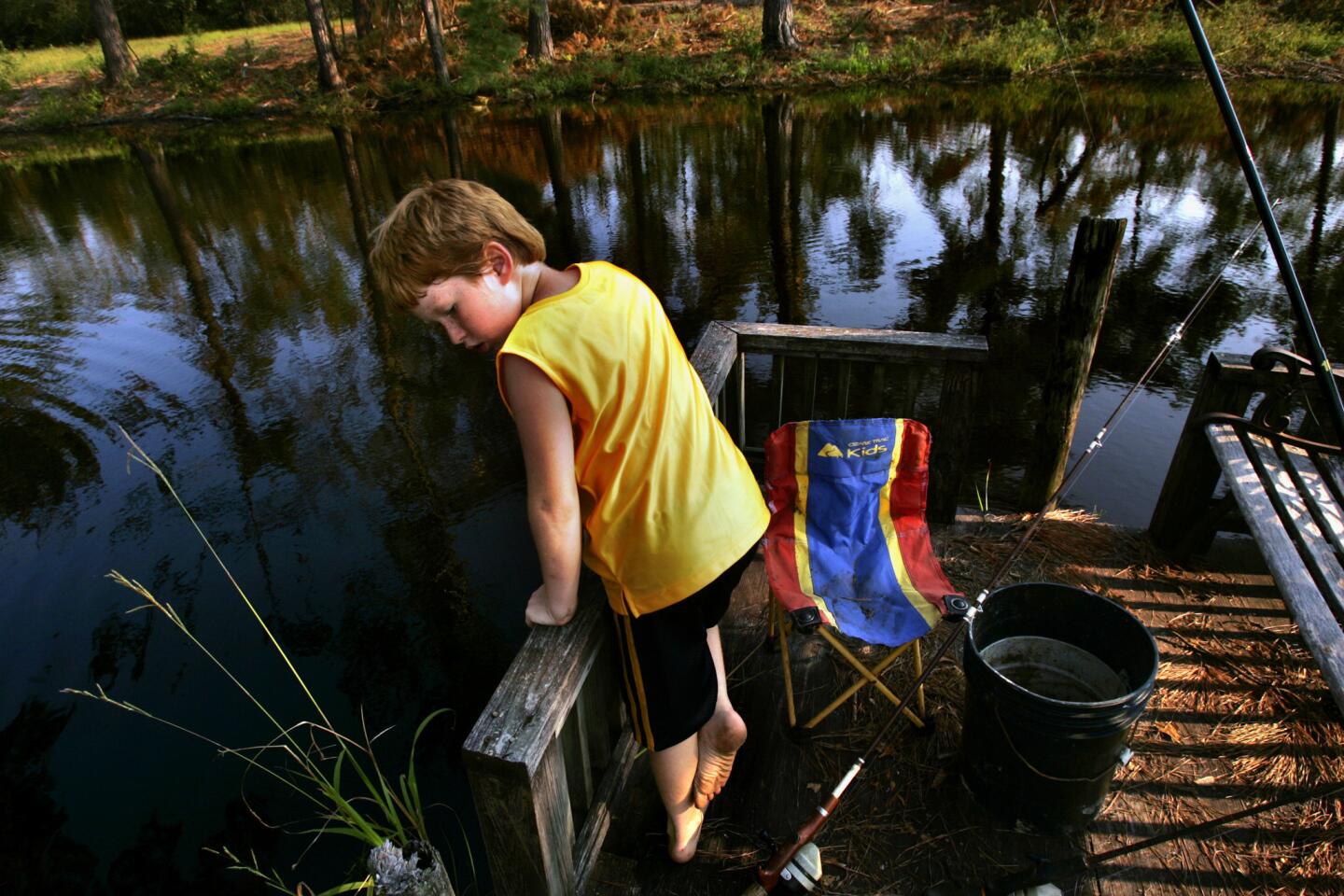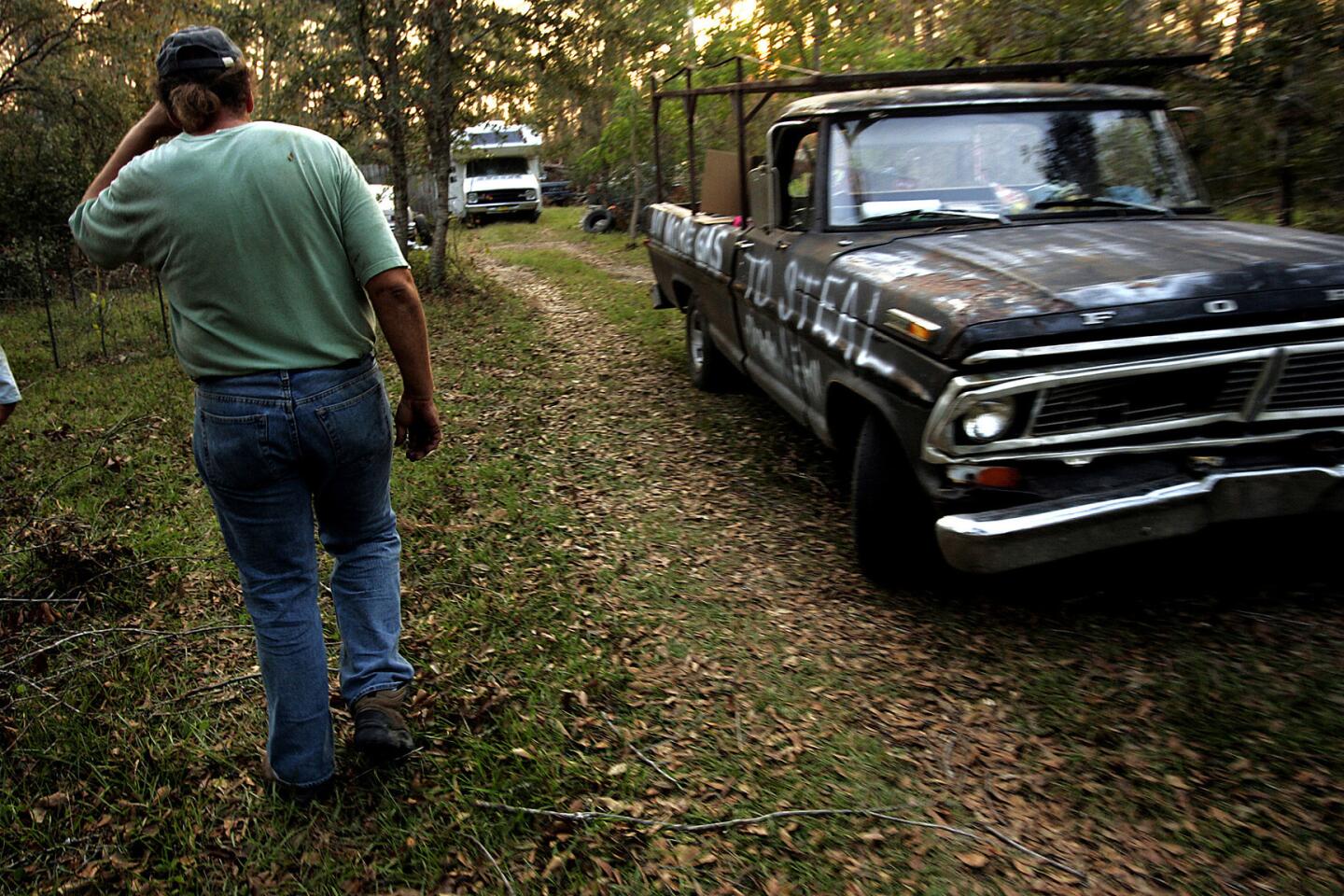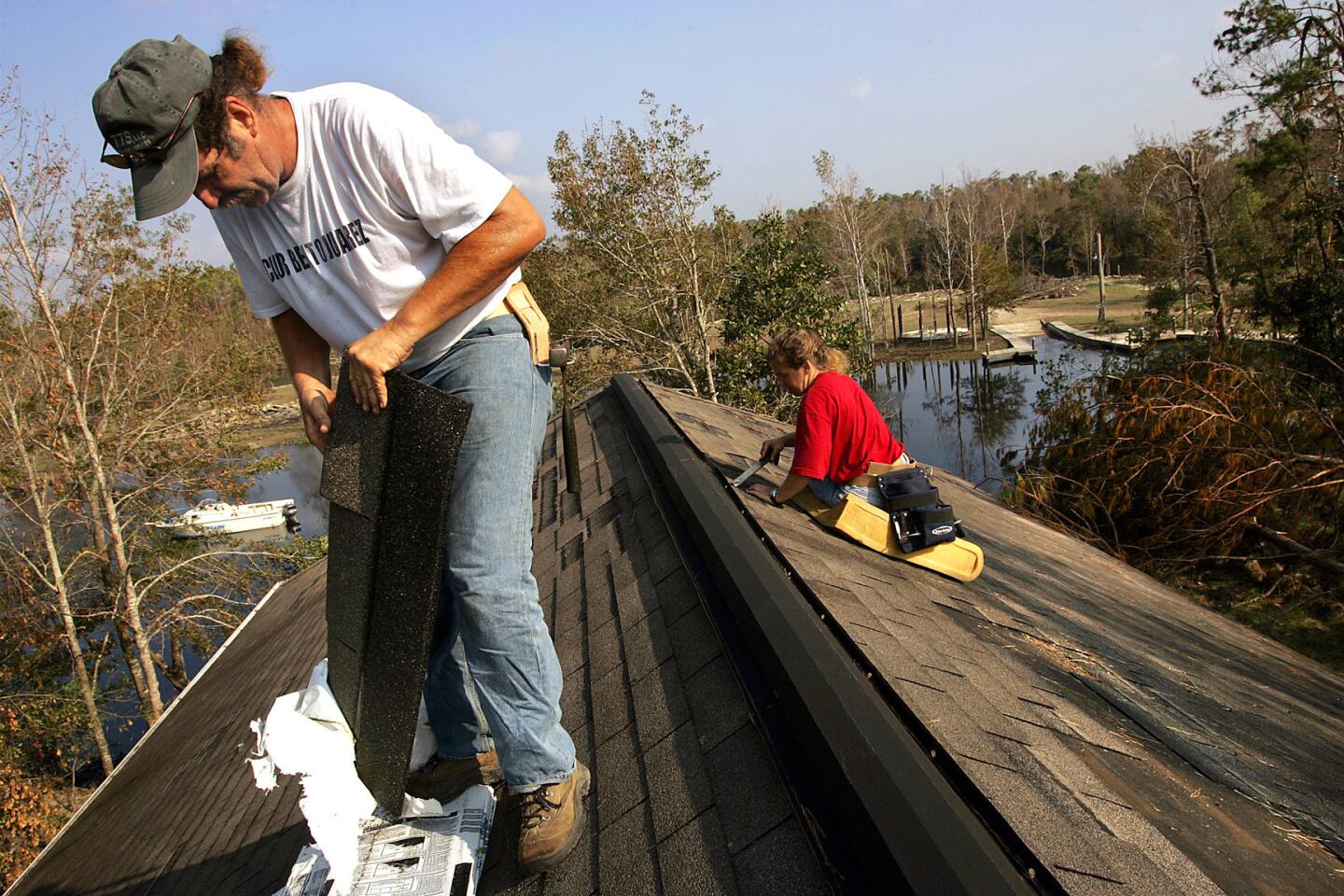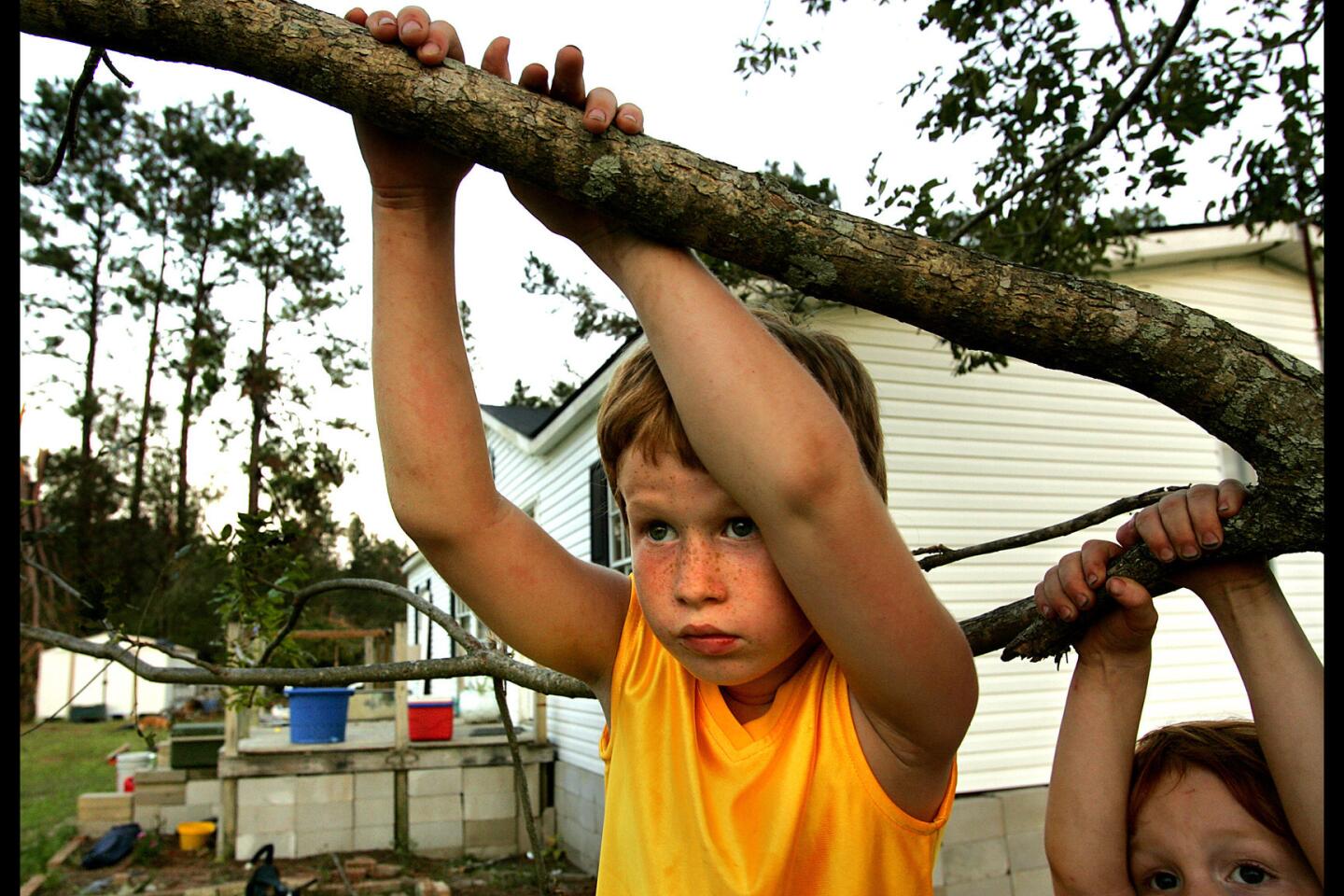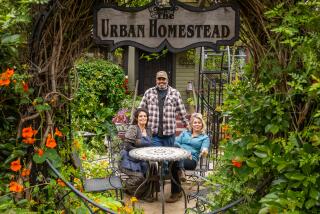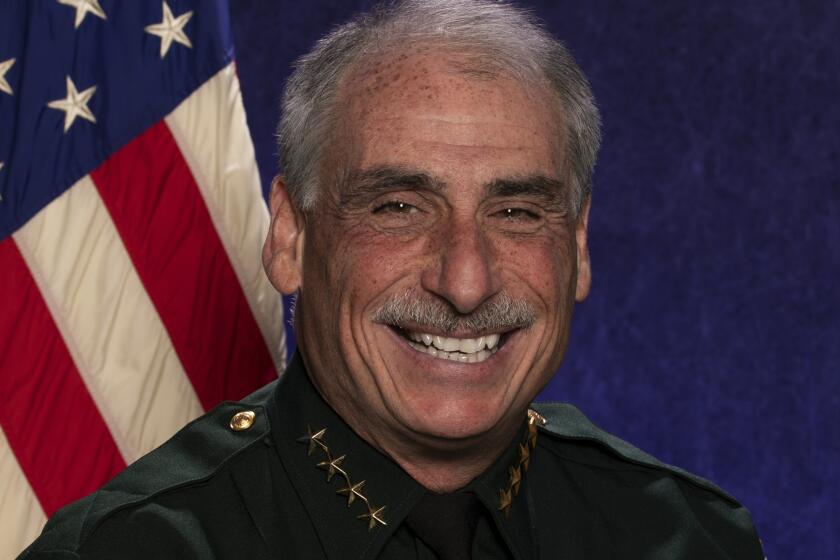From the Archives: Hammering Out a Future for Their Boy
On a scorching Mississippi day, Sara Fairchild and Bobby Danny Chancey squatted on a customer’s storm-ravaged rooftop, hammering out a new life for themselves, one shingle at a time.
“Tool by tool,” said Fairchild. “Shoe by shoe,” added Chancey.
Theirs is a now-familiar story of loss and destitution wrought by Hurricane Katrina. But it is also a harrowing tale of survival -- and a family saga of love, faith and self-reliance.
Along with their 7-year-old son, Dillion, Chancey and Fairchild spent 13 hours in the swirling water that surged to 34 feet. They floated on furniture and clung to trees, rooftops and one another.
When it was over, they took stock of what was left -- virtually nothing -- and vowed to move forward on their own. They budgeted no time for complaining.
“We ain’t got time for that,” Fairchild said. “It don’t do no good, anyways.”
Katrina had reduced their shotgun-style house on a peninsula called Cadet Point to a pile of matchsticks. It was there that Dillion was photographed, shirtless, head in hand, a teddy bear nearby -- an image that appeared on the Los Angeles Times front page on Sept. 1. The bear had belonged to some other child. Dillion’s toys were gone.
The tools Chancey used in his work building sun rooms and repairing roofs also were gone, along with his coin collection, his old knives and swords and roll-top desk. The rocking chair in which Chancey had held baby Dillion while Fairchild worked as a casino dealer had vanished.
Katrina claimed the treasured antiques the couple had bought in their 20 years together. They planned to use that furniture in the retirement home they intended to build a few miles away, on a 4-acre lot they purchased 10 years ago. Fairchild imagined her dream house, nestled in the thick Mississippi pines, with stone on the outside and a wraparound porch.
Fairchild’s jewelry also was lost. Chancey was proud that she had been able to stop working as a roofer with him and take a job at one of the coast’s 12 casinos. He loved to see her nails painted, and he gave her enough rings so she could wear a different colored stone on every finger.
When Katrina’s winds quieted and the water began to ebb, Chancey told Fairchild: “At least we got out with the shirts on our backs.”
She laughed, and he asked her why. “Because,” she replied, “you ain’t got no shirt.”
Humor sustained the members of this Mississippi family. They also adhered to a spirit of self-sufficiency, pledging not to wait for someone else to help them put their lives back together.
“What are you going to do?” Chancey said. “There’s doers and there’s don’t-ers.”
Like so many on the Gulf Coast, Chancey, 47, and Fairchild, 37, went to sleep the night before Katrina hit thinking it was just another hurricane. By the time they found themselves on their roof, with water lapping at their ankles, they knew they had misjudged the storm.
It was 6 a.m. on Aug. 29 when Chancey, Fairchild and their golden-haired son held hands and prayed, asking God to protect them. Then they dived into the water.
About then, the couple recalled, Fairchild reminded Chancey that she couldn’t swim. He told her to remain behind while he put Dillion on his back and swam to the house next door, which was not fully submerged. A baseball bat drifted by, and Chancey grabbed it to beat in the door. He tossed his son inside and went back for Fairchild.
For a while, they floated on couches in their neighbor’s glassed-in porch. But the water kept rising, and the couches started sinking. Chancey decided they had to get out.
He guided them to a stand of trees, bending the branches together to form a small sanctuary. Chancey saw a hunk of someone’s roof glide by. He seized it, and the family clung to it while waves washed against them from three directions.
They thought their prayer had been heard because two minutes after they got out of their house, it was gone. One minute after they escaped from their neighbor’s home, it disappeared too.
They said they spent 13 hours in the water. Two and a half weeks after Katrina, Dillion told his parents he still felt seasick.
Then came one terrifying night in a shelter. Storm survivors were packed inches apart. Trauma and danger were in the air.
All night long, Chancey held Dillion to his chest. He said he feared for his family, and decided that they would just keep walking until they found food and work. They walked barefoot for more than a day, eating meals passed out by the military. Banks were closed, telephones didn’t work. They found clothes in handout heaps on the streets.
At one point a car slowed down beside them. The driver gave Chancey a pair of shoes -- 13s, three sizes too big.
“I wore those shoes flapping and flapping until they had holes all over,” Chancey said.
They took a free tent from a Red Cross station and walked back to their lot at Cadet Point. Most of the house was gone, but a corner of the attic remained. Bo, their 3-year-old bulldog-lab mix, crawled out of the spot where, two days earlier, his owners had told him to stay. Chancey heard a mewing from nearby.
“There’s Speedy,” he said, and the family cat tiptoed back to them.
Chancey is a strapping 6-footer with deep-set, dark blue eyes. His sideburns and moustache have gone gray, and his small ponytail peeks out from an ever-present baseball cap.
At 4-feet-11, Fairchild is solid as steel. She contains her long, light-brown curls with a clip. Her fair skin has toasted from these past weeks outdoors.
Dillion has his father’s strong build, and his mother’s pale blue eyes. He was ecstatic when he found his youth football picture amid the debris on their property.
“I know this is important to you, Daddy,” they said he told them as he solemnly presented the photo to his father.
Right away, the couple, who never married, knew they had to get out and work. Biloxi was exploding with new construction before the hurricane, and Chancey had built up a steady business.
“We just had to get out there and work with what we had in our pockets,” he said. “Except, we had no pockets.”
Five days later, they scraped up enough money doing odd jobs to buy a hammer and tool belts. A roofing job gave them enough money to buy a $400 truck from a friend who ran a junkyard.
Even though they owed $100 on the truck, they earned enough from another job to buy a ramshackle camper for $500. They moved it to the lot where one day they still hope to build their castle in the pines.
With Biloxi schools still closed, and with no power or water on their property, Chancey and Fairchild sent Dillion to stay with an aunt in the western part of the state.
On the houses left standing around Biloxi, new roofs are in high demand. So Fairchild and Chancey work as long as there is daylight.
“Every time we get paid, we go buy something at Home Depot,” Fairchild said. “A chain saw, a regular saw, a ladder ....”
“That just kills me,” Chancey interjected. “I had three brand-new ones in my shed.”
They said they had little use for whining, or wondering why the government hadn’t stepped in to make everything better. Fairchild and Chancey stood in a Federal Emergency Management Agency line for three days, and when nothing happened, they walked away.
“People just sit back and say ‘FEMA’s going to take care of you.’ We’ve heard that every day,” Chancey said. “But it might be a year before you get anything from FEMA, and we’ve still got to live for that year.”
Before he went off to his aunt’s house, Dillion told his parents it was not fair that some people still had their houses when they did not.
“I told him we can’t be mean-hearted like that,” Fairchild said. “I said it is good that they have a house. It’s just unfortunate that we don’t.”
Chancey and Fairchild had no insurance on their home. They still make their $450-a-month mortgage payment because they don’t want to lose the land.
“Some people got other people to fall back on,” Chancey said. “We take care of ourselves.”
Chancey said he wished his “little lady” didn’t have to be out in the hot sun, pounding nails. He said he wished the casinos were still standing so Fairchild could work there instead.
On the other hand, Chancey said, as he cast a smile toward Fairchild: “Look, baby. Some people pay to go to the sauna and sweat and drip all day. You got one for free.”
Times staff photographer Carolyn Cole, in Picayune, Miss., contributed to this report.
More to Read
Sign up for Essential California
The most important California stories and recommendations in your inbox every morning.
You may occasionally receive promotional content from the Los Angeles Times.
